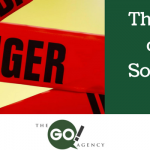Does it seem like every brand and minor celebrity you know is starting a podcast? Now more than ever, audio is a thriving source for both information and entertainment—during the pandemic, nearly 45% of the WORLD has admitted to getting hooked on podcasts. The reason is fairly obvious: the relatively low production cost. If you invest $50 in a decent mic, $10 on a pack of beer, and manage to get two of your friends over to a make-shift recording space in your living room, you can start a podcast.
Caveat: with very little effort you can start a podcast…but it probably won’t be a very good one.
Think of the podcasts that you listen to, either for fun or for educational purposes. They have structure, research, good production, and a well-spoken host who can guide the conversation.
Even on relatively freeform, interview-based podcasts like The Joe Rogan Experience or WTF with Marc Maron, have prepared topics and the host or a production assistant has done cursory research into the interviewee. As funny or insightful as you might think you are, the only people who want to listen to ninety minutes of you and your friends’ unstructured riffing and inside jokes are you and your friends.
This goes double if you’re planning on starting a podcast that’s tied to your brand. If your podcast is a professional endeavor, you’d better put the time and effort in to produce a high-quality show. It’s very easy to tell when something is just slapped together and reflects very poorly on you and your business. So how can you create a high-quality podcast that all of your LinkedIn connections will be tripping over each other to guest on?
- Choose a name and a focus. I’ll use myself as an example. I wanted to create an educational, interview format podcast that talked about the various aspects of marketing, even if they were outside of the wheelhouse of The Go! Agency. So, I started The Social Marketing Academy. Everything you need to know about what the podcast is is in the title. It’s about social media marketing and it’s an informational show. Your focus can be as broad or narrow as you want. I talk to people from even the most niche corners of the marketing world, so my show is pretty broad. If you’re running a podcast that’s tied to your bespoke sneaker company, your focus will be considerably more narrow. And that’s ok!
- Have a format. Feel free to break the episode up into chunks. Back to your bespoke sneaker company, your podcast could be three regular segments: shoe news and rumors at the beginning, the main topic of the episode in the middle, and answering a few fan questions at the end. Come up with this and stick to it before you get too many episodes in.
- Invest in good equipment. Do not look for the cheapest mic on the market. This is an investment. You can get a great podcasting microphone for $150. Also, use professional editing software like Audacity, Garageband, or even Adobe Audition if you have it (this is kind of like killing an ant with a nuke, though, so don’t go with this option unless you’re already paying for the Adobe Suite.)
- Vet your guests. If you have a lot of professional connections, a handful will crawl out of the woodwork and want to be on your podcast. Having people in your industry on your show is a great opportunity for cross-promotion, but unfortunately, not everybody has a meaningful or interesting story to tell. Do your research and familiarize yourself with your potential guests’ background, work, and accomplishments before you commit to a recording date. Cross-promotion is great, but it’s more important that you put out a good episode.
- Be consistent. As with any professional endeavor, commit to what you’re doing and if you’re going to stop, then stop. There’s nothing less professional than missing uploads and constantly making excuses for why your podcast has been MIA for six months. Also, when you have an episode in the can, get it out on schedule, especially if you recorded with a guest. They’re going to want to share it on all of their channels and it looks bad if you’re being transparently lazy about uploading.
- Write a script and be prepared. Don’t try to wing it when it comes to asking questions or doing the opening monologue of your show. Have what you want to say prepared. If you’re a good improviser and can mix it up, then do so. If you’re not, practice your public speaking in front of a mirror. If this is your first rodeo, have a friend over and go through a mock episode with them.
Everything you produce, whether it’s podcast episodes, posts on social media, or blogs could be a potential customer’s first introduction to your brand. This is why, in every blog where I talk about the production element of marketing, I stress the importance of taking it seriously. You have full control over the image your brand projects.
I’ve given you all the tips to running a successful podcast from the comfort of your kitchen, but if you have the resources to call in the professionals, by all means, call on the services of The Go! Agency.





